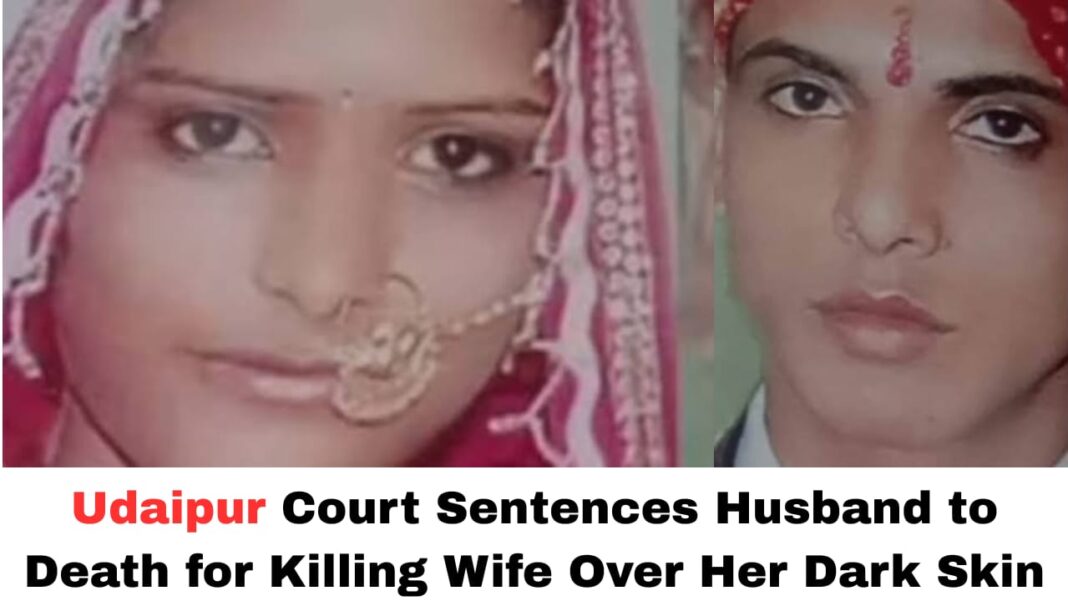Digital News Guru Rajasthan Desk:
A Crime Against Humanity: Udaipur Court Hands Death Sentence in Heinous “Colorism” Murder Case
In a landmark verdict delivered this week, the Additional District and Sessions Court at Mavli in Udaipur, Rajasthan, sentenced Kishan Lal (alias Kishandas) to death, along with a Rs 50,000 fine, for the brutal murder of his wife, Laxmi, in a case deeply rooted in colorism and domestic cruelty. The court deemed the act not merely a crime against one individual, but “a crime against humanity.”
The Crime: Deception, Shame, and Extreme Violence
On the night of June 24, 2017, Kishandas lured Laxmi—who had been subjected to repeated taunts about her dark skin and weight—into believing he had procured a medicine that would lighten her complexion.

When she observed the liquid smelled like acid, he cruelly responded: he set her ablaze using an incense stick, then poured the remaining chemical over her. Trapped in a locked room, Laxmi could not escape. Despite intervention from her in-laws who rescued her and rushed her to the hospital, she succumbed to her injuries a few days later.
The Evidence: Dying Declaration and Deep-Seated Prejudice
Before her death, Laxmi managed to make a formal statement—a dying declaration—that would become key evidence. She told authorities of Kishandas’s relentless verbal abuse: he repeatedly called her “dark” and “fat,” suggesting she was unworthy. This declaration, combined with testimonies from 14 witnesses and 36 documents presented by the prosecution, formed the backbone of the case. Public prosecutor Dinesh Paliwal described the ruling as “historic,” noting its broader implications, and warning society: “If we don’t save our daughters, then who would?”
Judicial Outcry: Unforgivable and Unimaginable Cruelty
Judge Rahul Choudhary characterized the murder as falling into the “rarest of rare” category—warranting the harshest form of legal reprisal. He observed that the brutality of Kishandas’s actions—shattering trust, pouring the chemical as she burned—was beyond moral comprehension and “cannot even be imagined in a healthy and civilized society.”

Broader Implications: Colorism’s Deadly Repercussions
The verdict has ignited urgent discussion around colorism, a deeply embedded prejudice in Indian society. The act of violence, motivated explicitly by Laxmi’s complexion, underscores the deadly consequences of assuming lighter skin equates to worth.
The court’s reference to the crime as one against all of humanity encapsulates a collective failure to protect vulnerable individuals from discriminatory violence. It sends a signal that prejudiced and violent behaviors will attract accountability at the highest level.
Legal Path Ahead: Appeal Looms, but Sentencing Sets Precedent
Kishandas’s defense lawyer, Surendra Kumar Menariya, contends that Laxmi’s death was accidental and that the verdict lacks adequate evidence. However, with the death sentence upheld, the judge and prosecution assert it stands as a precedent—the judiciary must remain unswayed by gendered or beauty-related biases. The convict now has 30 days to file an appeal.
Social Impact: A Symbol and a Warning
This case starkly highlights how internalized prejudices—rooted in social standards of beauty—can lead to unspeakable acts of violence. The verdict stirs a much-needed discourse:
- Justice System: The ruling demonstrates that courts can and will categorize extreme domestic violence rooted in prejudice as “rarest of rare,” imposing the maximum penalty without reservation.

- Societal Reflection: Public prosecutor Paliwal’s poignant question—“If we don’t save our daughters, who will?”—resonates as a call to reshape societal norms that contrast dignity with skin tone.
- Preventive Message: The decision serves as a landmark legal warning against crimes born of discriminatory mindsets, particularly against women, reinforcing zero tolerance for such behavior.
Conclusion: From Personal Tragedy to Collective Reckoning
What began as one woman’s plea for fairness—literally and metaphorically—ended in tragedy. Yet, the court’s firm stance makes this case reverberate far beyond the walls of the courtroom. It becomes a sobering testament to both how deep societal prejudices can sink and the power of the judiciary to confront them head-on.
Laxmi’s death, while profoundly tragic, is not in vain. The verdict affirms that violence in the guise of beauty standards will be met with the full force of justice. Her story may yet become a turning point—prompting introspection, accountability, and a long-overdue reckoning with the colorism that imperils so many.
You May Also Read: Vikram-32, India’s First Homegrown 32 –bit microprocessor








